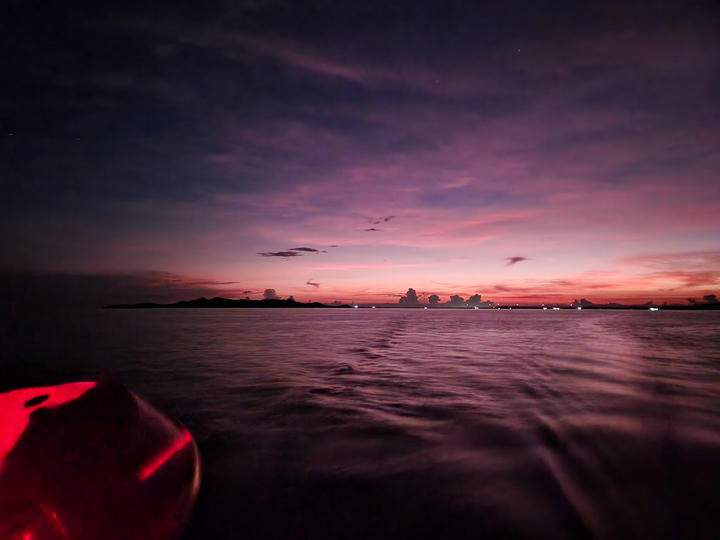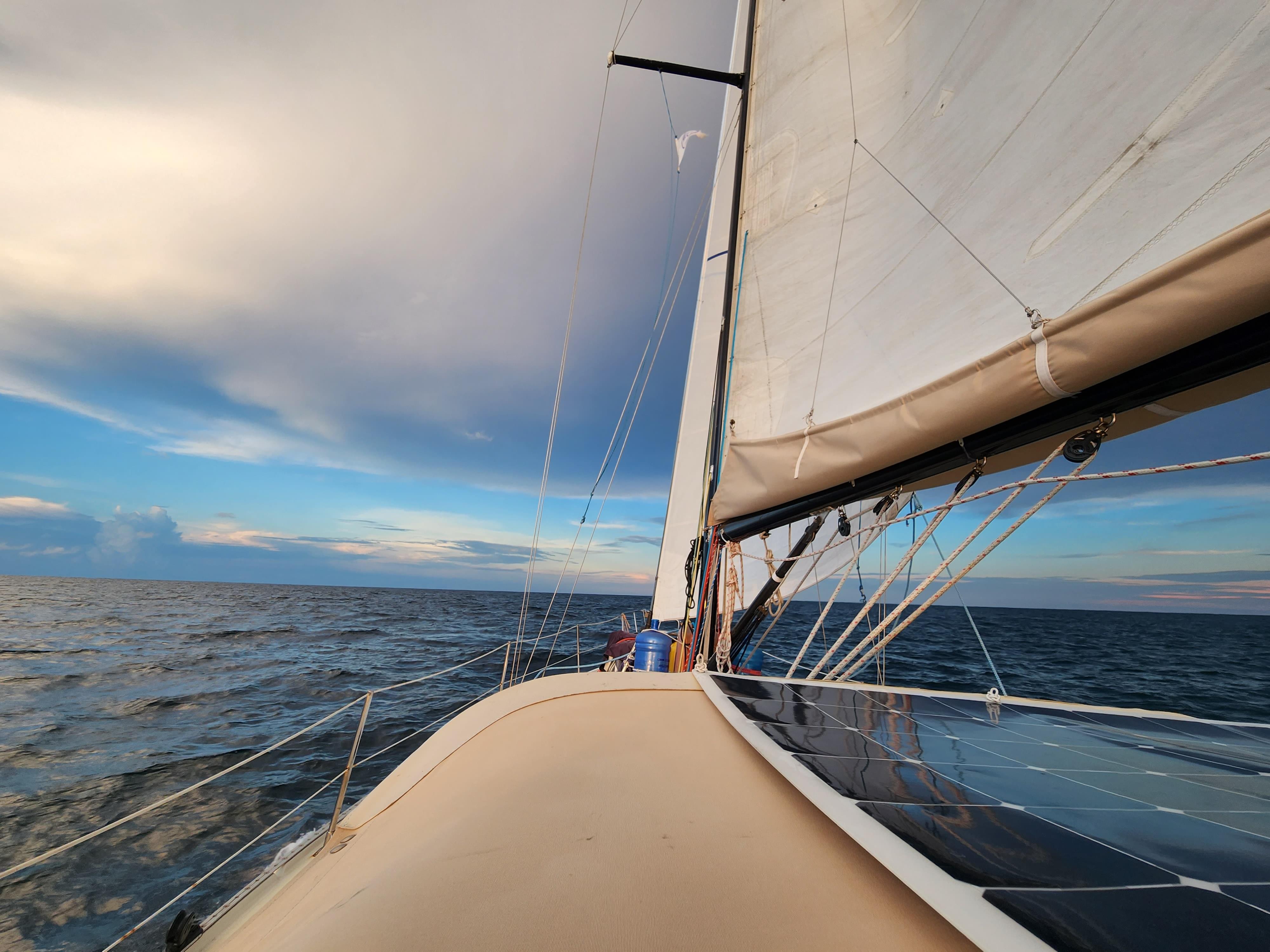Day 1 - Thursday, September, 29th 2o22: Departure day
Even though we only left at 3:30 in the afternoon, our departure day started way earlier. Let's just say that at 8 AM, we had our breakfasts and were starting our cooking shifts. Potato salad, lentils, meat with potatoes, pasta and broccoli sauce, sandwiches, different sorts of drinks and snacks... We were determined to remain well-hydrated and well-fed during this passage for at least the first few days. Each of us went for two hours of cooking, while the other was preparing for the passage: shift bag, last downloads and phone calls, securing things inside and outside to make sure they don't fly all around on different tacks... on departure days, the preparation is endless. Moreover, arguably, all our boat work in Manzanillo Marina Club and over the past few days was also in preparation of the passage. In addition to the big jobs in the marina, we checked some other stuff items off the list: we had come up with a system to secure the food we had piled up in the shower, we secured the boat doors that had been banging open and shut during every passage as the boat swings (cabinet doors and the bathroom door) and we even tuned the rig underway. Last but not least, the past day had been spent checking out of Colombia (with our incompetent agent who delivered a zarpe with a different departure date and crew roles than what we asked for. Agents are compulsory for checking in and out of every CITY in Colombia which we were clearly unhappy about, especially after the bad experience, not to mention the price, around 300 USD!), doing a last round of fresh food provisioning, and spending almost our last Colombian pesos in souvenirs in the center, walking distance from our downtown anchorage.
But after all that was covered with more and more adrenaline rush as the day progressed, we had to leave. Anxiety from our last time at sea was of course present, but I guess, we were not going to spend the rest of our Tire-Bouchon days in Cartagena, right? So at around 3:30 PM, Tire-Bouchon spun on himself lifting his chain and anchor (set in another direction - which explains the spin) with his newly repaired windlass and took off from the scenic anchorage by the Old Town of Cartagena. We followed our steps (and the shipping lane) out of the inner bay, avoiding fishermen setting their nets Colombian way and speed boats transporting tourists back and forth (how many times have we had to decline offers for such trips in the city...). We reached the entrance and could see the statue that marks the middle high grounds in daylight this time and turned right. Every time we went in and out of the bay, we arrived from the South, through the Boca Chica entrance and its hour-long channel of markers in the large outer bay. Today we were bound for the Northeast, so, in order to save those lost miles motoring to go South, we had planned for the small boat exit in the Northwest of the outer bay: Boca Grande! A low draft passage between an underwater ancient city wall (one more), hand-made to block the mile-wide bay entrance by the heart of the city. Today, an opening remains marked by two markers 30 m apart for boats able to sail in 5 m of water. Cruisers on the WhatsApp Cartagena group had been encouraging: totally doable! Indeed, as nerve-wracking as it is to head into an invisible breakwall relying only on the position of two markers (and discussing strategies to foul pirates by moving the markers around to lead them in the wall) and watching the depth drop to a dangerous 12 feet (4 meters), we made it! And were soon out in the rather choppy waters of the shallow patch right outside the bay. The frequent chop was killing our engine speed but we motored a bit to reach a comfortable depth before raising the main sail, falling off and starting our journey.
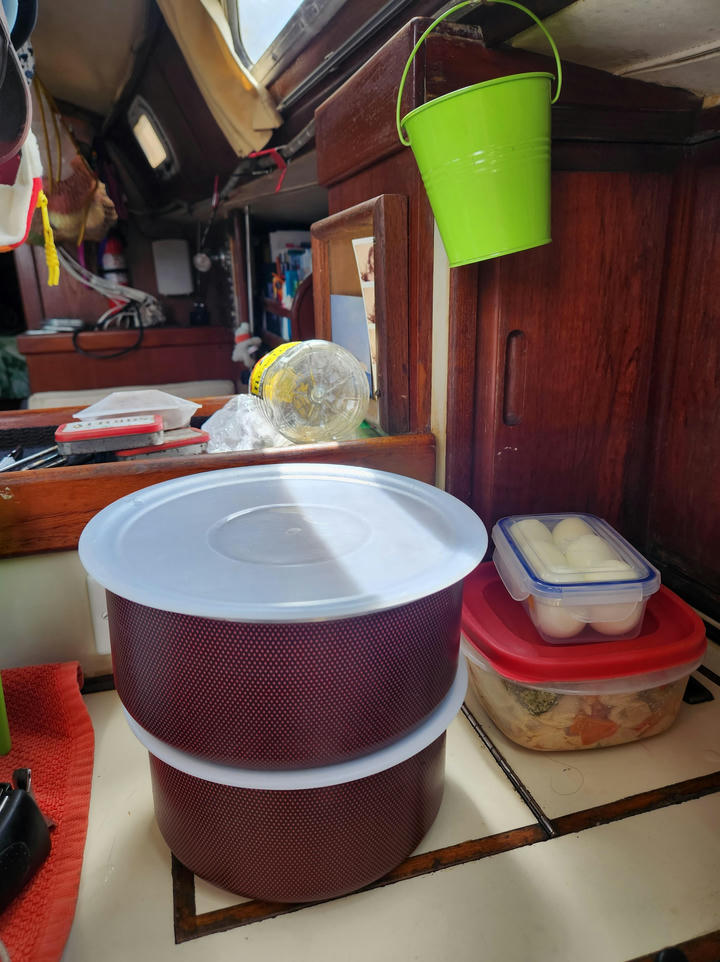
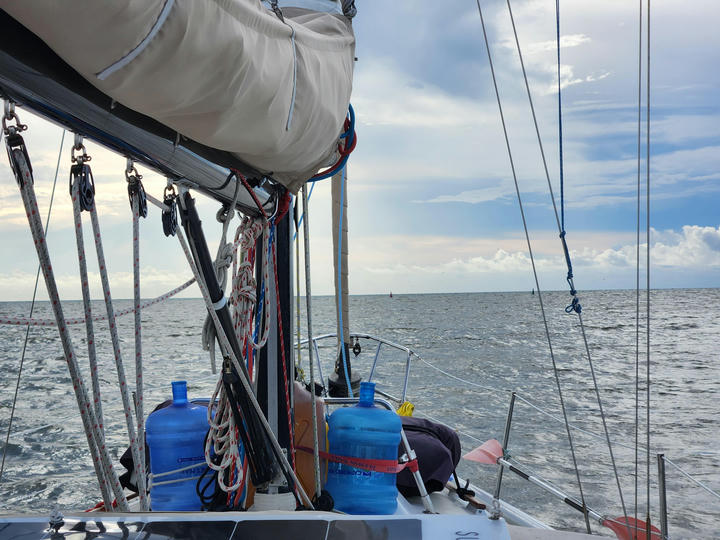
The first night
We were gliding closed-hauled on surprisingly flat seas while the sun was setting behind clouds on the horizon. The sight was beautiful and our anxiety was revived by the perspective of the night starting already. Yalçın warmed up his potato dish and we enjoyed a lovely dinner sitting on the deck. Delicious food, good company and a nice view... Are they the signs of the calm before the storms? At 6 PM, I went down to the cabin to start the shifts and try to get some rest.
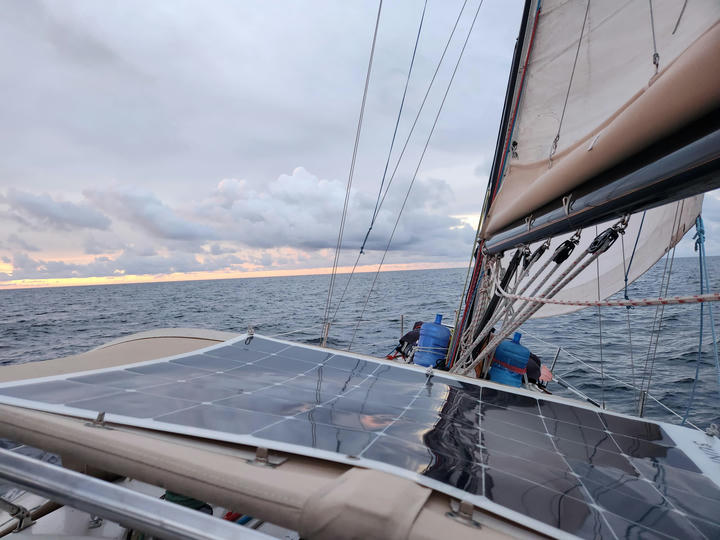
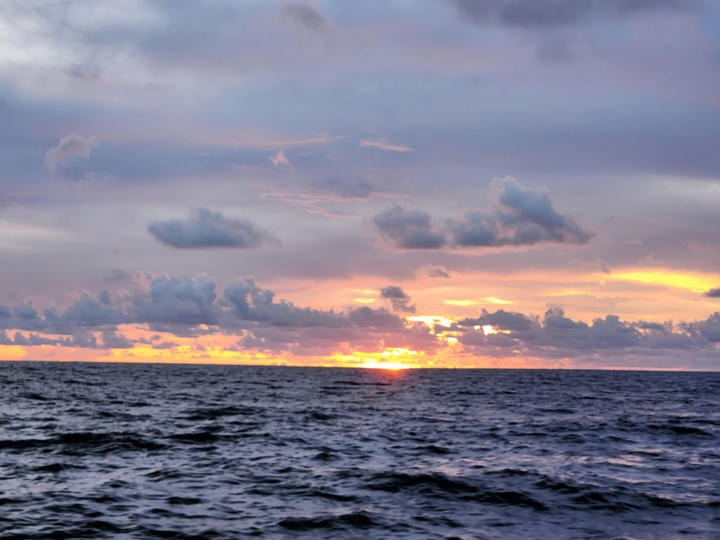
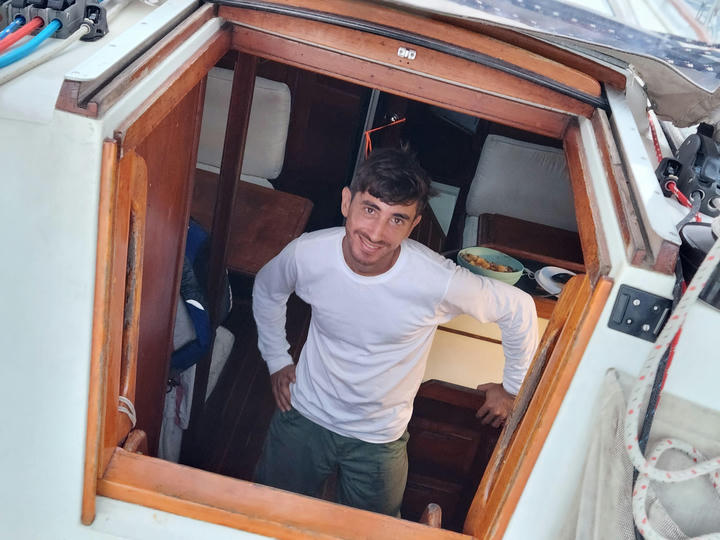
It takes a few nights for the body to get into the rhythm of the sea. Especially with the both of us getting tired roughly at the same time on the first night, the beginning is sometimes tough. That is why we start the shifts pretty early. Even if you don't get to sleep, at least you can rest. In addition, I had what I hoped to become a headstart from the day before. I just didn't sleep enough, waking up at 5:00 in the morning. Preparing all day for the passage was physically tiring too. Maybe I can just fall asleep at 18:00 and sleep for 3 hours nonstop. Not so lucky! But I did get an hour.
The goal for the first night was to reach the Barranquilla waypoint, an arbitrary point we picked roughly 25 miles offshore from Barranquilla. We were recommended to give a huge berth to Barranquilla and be there during the daytime. We need daylight to avoid any floating hazard brought by the river. And going offshore helps with that too. Also, the interplay between the currents and the wind creates dangerous waters near shore. The forecast for winds and currents were also showing favorable conditions offshore, along with a single tack close reach to there. The forecast was pretty accurate, we sailed all night in mild conditions. However, we were a bit slower than we hoped for.
Our three-hour shifts went well, I was out from 9-12 and 3-6 and Yalcin took 12-3 and 6-9. During the dark night, we were able to see glowing Cartagena in our stern and Barranquilla at our bow.
Day 2 - Friday, September, 30th 2o22
Eventually, the first lights came and clouds receded a little but not quite. We were in for a day of dodging squalls in order not to end up with momentarily more wind than we can chew. We were approaching Barranquilla and the sea conditions were still extremely flat. It seemed like our weather window was well-chosen and we decided we may not need to go as offshore as we originally planned as this was no ordinary day and we were going the opposite direction compared to the people who gave us advice.
At 11:00, we hit the river. We could see a clear separation between the blue water we had been sailing in so far and the brownish-greenish river water. We'd have to be attentive to whatever Rio Magdalena was going to throw out at us.
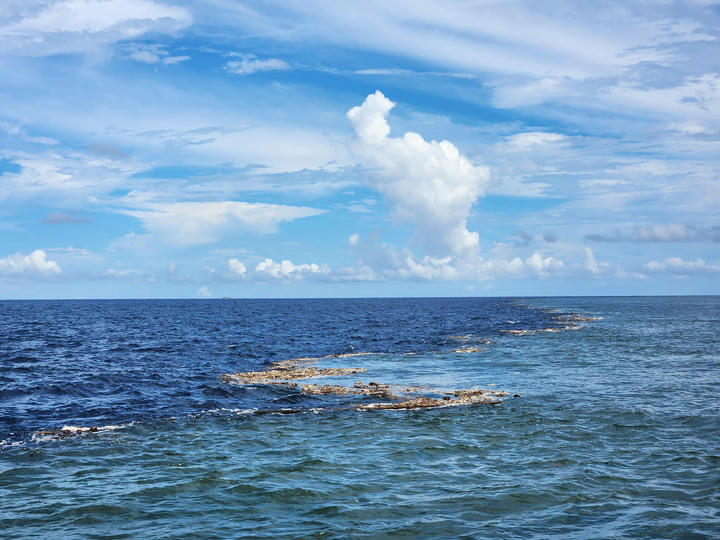
We were going 4 knots full rig downwind for a while but the wind started to lower, which means... Spinnaker! We carried it for a little while, Yalçın hand-steering and me noticing its colors are perfectly assorted to the Colombian courtesy flag we are still carrying on our starboard shroud.
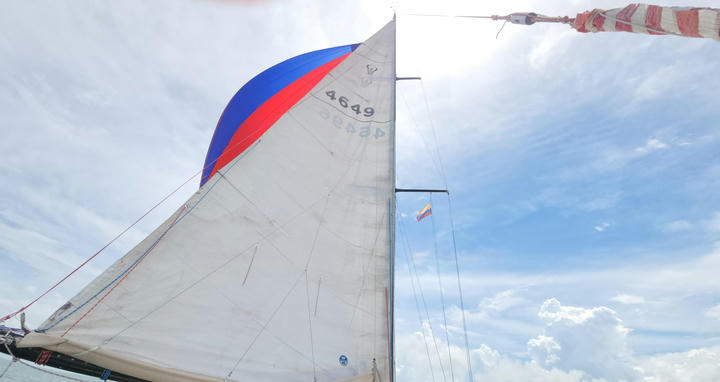
Soon though, a cloud started to catch up with us and unsure how much wind it was going to bring us, we decided to be on the safe side and to douse the spinnaker. That was a good choice as the system kept expanding our way and we ended up running 9 knots with our double-reefed main. Let me reassure you that we were not in a proper squall like last time, instead, we were being helped by a favorable north-setting current probably the same current that prompted people to tell us the sea conditions were bad around here: we could easily imagine that with such a strong current, contrary winds and the outflow of the river, the water can get messy. In our case, everything was aligned and pretty much in our favor... This is when you can congratulate yourself on the weather window choice!
We spent the rest of the afternoon adjusting our course to leave suspicious clouds on our side while reefing unreefing to make sure that despite our efforts, we wouldn't be caught unprepared. After a while, we also started seeing things in the water. Nothing like tree trunks, but small bushes of plants that wouldn't look to good on our propeller. Yalçın went to the bow to guide me as I was steering the boat to avoid them.
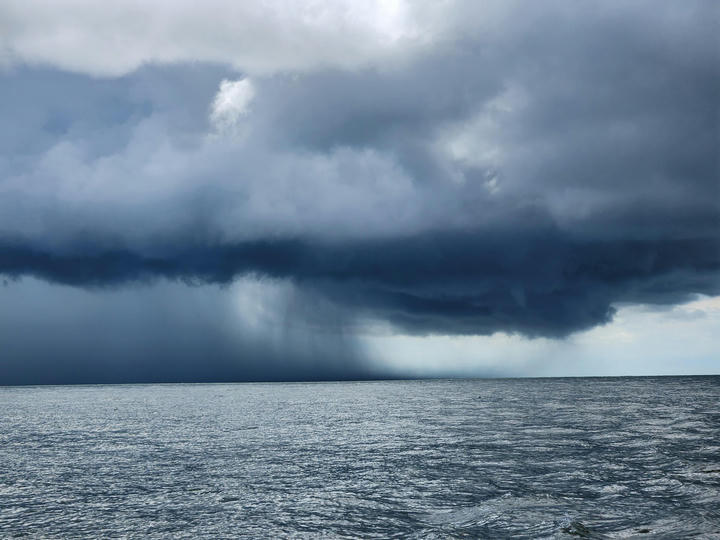
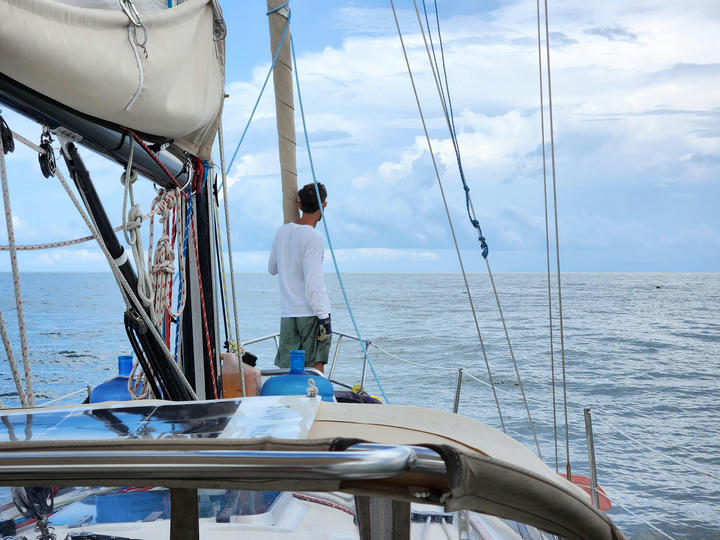
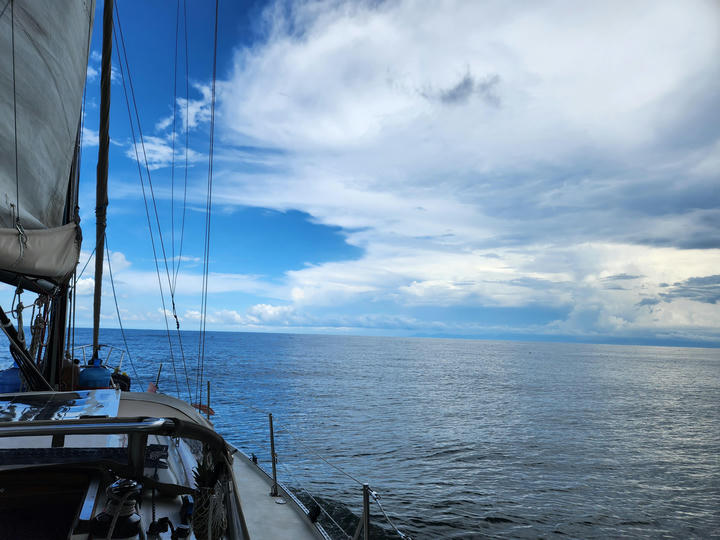
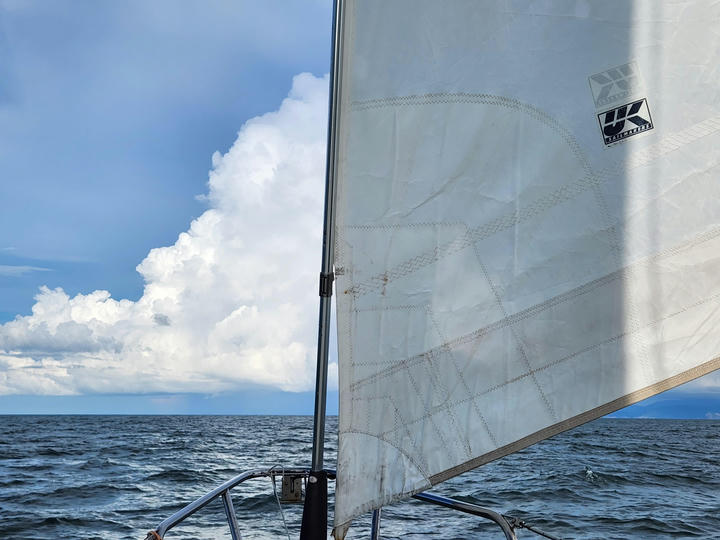
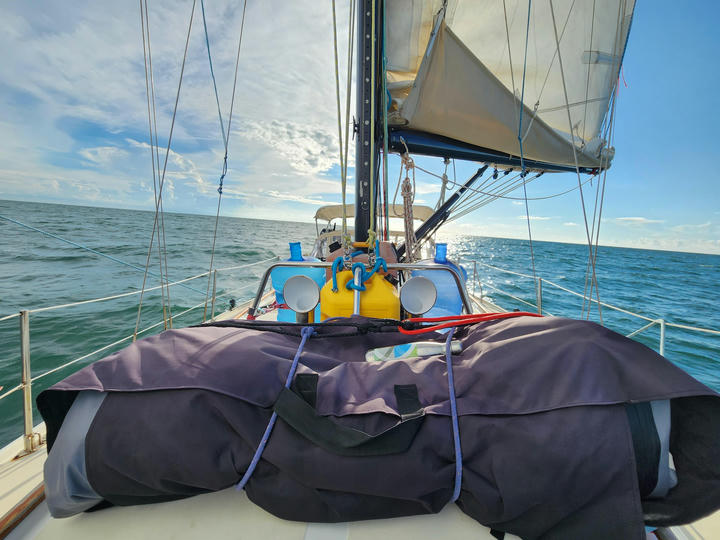
Our progress led us to sight of the mountains surrounding Santa-Marta which offered a beautiful sight. We watched it approach as the sun was slowly setting, reflecting on the meaning and physics of katabatic winds, a land breeze supposed to be cold air "falling" from the mountains at night. They are known for their possibility to gust quite high (Wikipedia says very occasionally to hurricane-force winds) for a few seconds at a time. We were not that worried as we were at a safe distance and everything was calm. Still, at nightfall, as we were noticing subtle rainbows in the clouds above the horizon, a gentle rain started. With no cloud on top of us, the origin of this rain is still a mystery to us up to this day. We called it 'katabatic rain'. Life was good!
The second night
Once again, the night came in earlier than we had wanted. The sunset was beautiful though and this time, we had dinner in the night: the nice potato salads Yalçın had prepared before departure (we called it a potato day!). We started shifting shortly after, at 7 PM, when I went to rest below. The wind started to die at first, with the sails occasionally flapping which made for loud sounds down below. At the same time, the darkness was lighting up all around us. Far to start with, but with our scared eye, every cloud looked suspicious... Was it darker than usual? Was it safe to go under, or will it start firing up as soon as we set foot under it? I could see the flashes from inside the cabin. After an hour or so of resting without sleeping, I poked my head out: "Is everything alright?" I was a little worried about the constant flapping of the jib which is quite amplified below deck. Yalçın explained that the hydrovane was steering poorly with so little apparent wind and that there was no rush to reach these lit up clouds ahead of us. Feeling revived and as I had been trying to harvest the little internet from my berth, I explained a possible strategy: we would go between these and these clouds, etc. Yalçın clicked immediately, he had been debating a plan for too long and my plan made sense. Soon, he fired up the engine and determinedly motored into the darkness as I went back to bed. I felt awake at the time but still had half a shift (one hour and a half) to try to sleep. I ended up sleeping for 45 minutes which killed me. I came out to take my shift more tired than when I left, did my best to not be grumpy and tried to understand Yalçın's updated plan. The good news was he had been able to get good internet and a full weather forecast, lightning activity was supposed to stop at around midnight. This knowledge had pumped him up to pass in between the cloud barrier ahead of us and he brieffed me about that low and long dark cloud that he was going around. It wasn't lighting up for now, we were leaving it to port but not too much as another system was active on starboard and we were getting closer to the shore that was poorly charted according to our chart and seemed to have shallows 5-7 miles in. It all seemed a little overwhelming but Yalçın had to sleep too and I took my shift, carefully watching the cloud to avoid. We still had internet, I was able to check the forecast from Yalçın's screenshots and check my emails. Trying to dilute my anxiety at lightning, I undertook to respond to an email from my editor for one of my articles - with a little luck I could use this last internet to send a revised document! Of course, that's the time the wind chose to pick up. We were motoring with a reefed main when the wind speed rapidly increased. I woke up Yalçın who had enough time to put on a tshirt in a rush. We put in a second reef with the engine on which we turned off later. We started running with this new wind main only. The wind didn't increase beyond reasonable but I was glad to have Yalçın on my side, yet sorry to have woken him up one hour only into his shift. This hour had revived him though - that must have been a deep sleep - and I took it when, for the second time, he offered he could take over and I could get more rest. Embarrassed to leave him with the hardest part of the night to handle, I started sleeping in the cockpit at first, but soon, went down to the quarter berth and passed out for three hours straight. When I woke up, we were out of the sketchy patch, the sky had opened and we were motoring in the windless night. I hurried back up to relieve the hero of the night who had led us through the lightning without any damage. It was 2 AM and I was determined to give Yalçın 4 or 5 hours of uninterrupted sleep to prepare for the serious lightning storm that was forecasted on our way in the afternoon the next day. The shift was easy motoring and I made myself at ease with a 4 AM snack and tea, music, podcast and sea watching. Tracking a container ship and adjusting the course was the most adventurous thing of that part of the night.
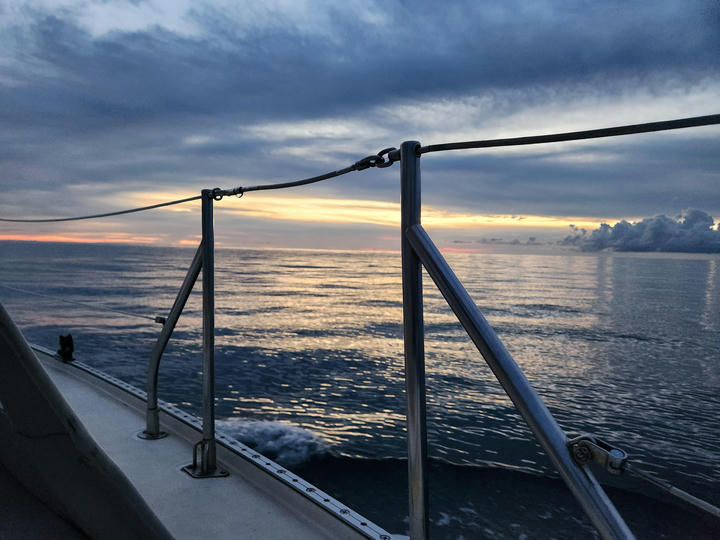
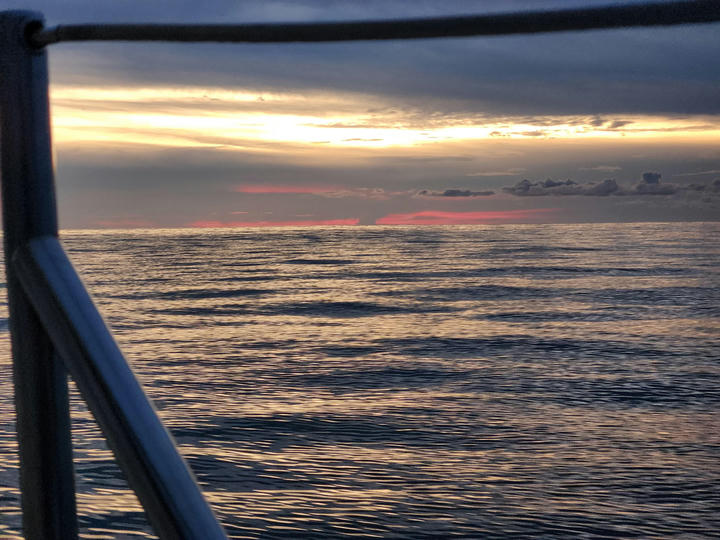
Day 3 - Saturday, October, 1st 2o22
Yalçın woke up a little before 7 AM, the time I was planning to wake him up, which would have given him an uninterrupted 5-hour sleep. I offered he'd go back to bed but seeing his energy, it didn't seem like an option. I had just turned off the engine that had been working for these entire 5 hours, mostly to give it a break as the wind was still quite low. I was unreefing when Yalçın showed up, he helped me and after setting a slow but beautiful course in the flat seas and the nascent morning, we set out for breakfast. Encouraged by my 4 AM snacking experience, we set up the table and I took out a bunch of items from the fridge intending to make scrambled eggs with tomatoes, a recipe stolen from our hotel in Minca. Yet, with Yalçın's presence, my tired mind which lost its 7 AM goal started to shut down, reminding me he too wanted to sleep. No eggs then but a simple bread breakfast (we had baguette(-like bread)!) and I gathered my belongings from the cockpit and passed out in the quarter berth for 3 hours. 3 hours of slow but beautiful sailing with blue sky on top of our heads (Yalçın's head mostly then), and Yalçın enjoying his Obama audiobook. He was loosely assisting Avocet in steering when I woke up. He fed me in the book and we had sandwiches as a second breakfast. Waking up seemed difficult and I felt dehydrated from the hours spent in the hot quarter berth. The sailing was so calm that I decided to set up for a saltwater shower to finish waking up. It was a first!
Later in the morning, Yalçın put the audiobook on speaker and we followed the process that led the former US president into the primary race. I offered Yalçın to take a snooze, which he gladly took as I followed more intricacies of the campaign I just got hooked up in. Still beautiful sailing in increasing wind with distant clouds instead of the scary lightning storms we had seen in the forecast. At least, for now.
The wind picked up gently, and we mostly enjoyed the glorious sailing conditions: flat seas and beautiful gliding full rig. The horizon was all opened and we felt tiny and blessed. Yalçın made popcorn at around 4 PM and we had our goûter at the bow: on our own private priceless theater. We wanted to think we were out of the blue.
At around 5:30, I came down to sleep. At that point, the wind had picked up quite a bit and chops had built up: Tire Bouchon will glide and then catch a train of wave - bam, bam, bam, bam - quite uncomfortable for resting because loud and making you airborne at times. I had helped Yalçın with reefing before going down. Unable to rest and worried by the grayness I was seeing through the carré (saloon) hatch, I came up to see how things were doing. Not too too bad. Yes, there was some gray around, more than what we'd ask for but nothing too threatening. The gray cloud on top of us was indeed gray but on a nascent night, we could still see stars ahead of us.
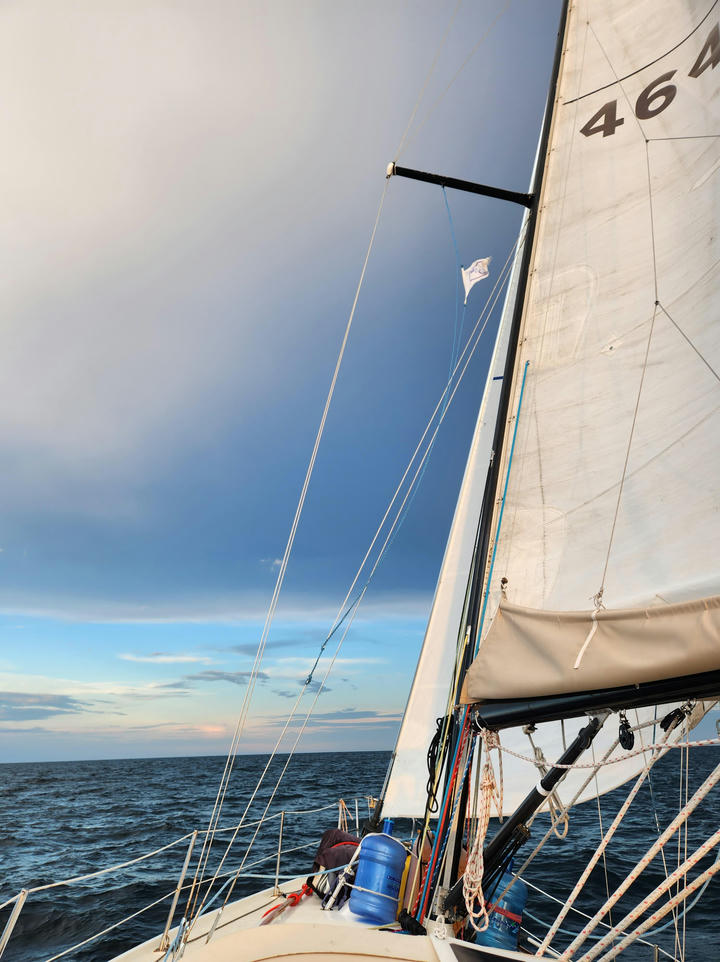
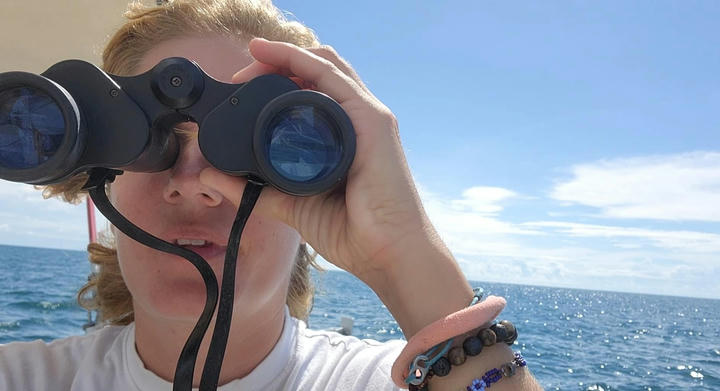
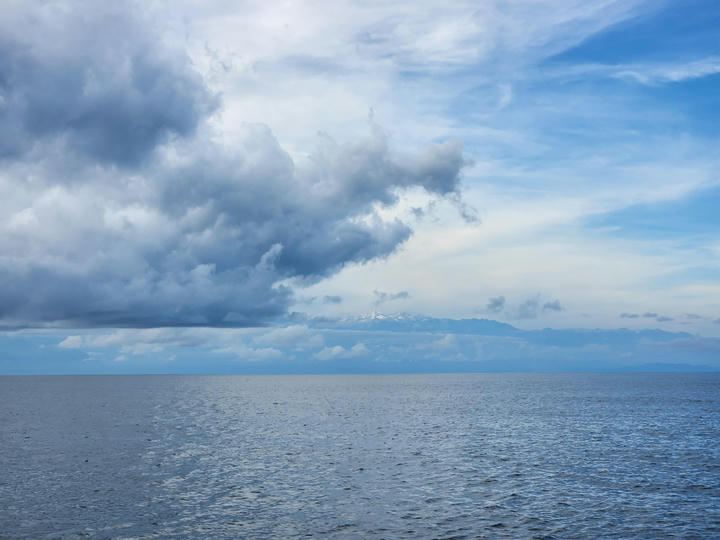
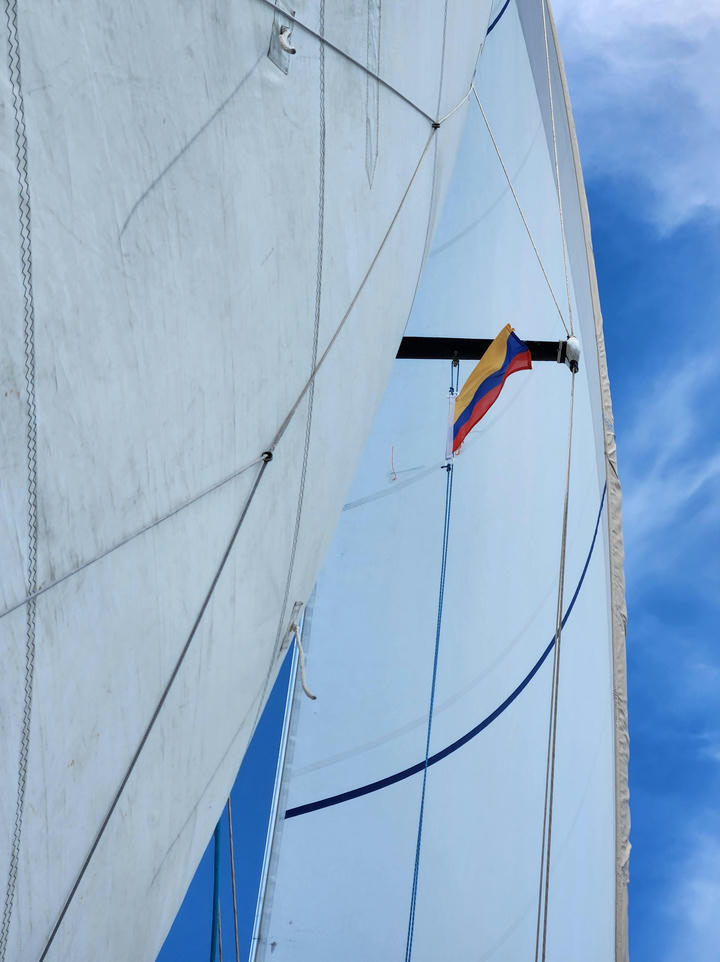
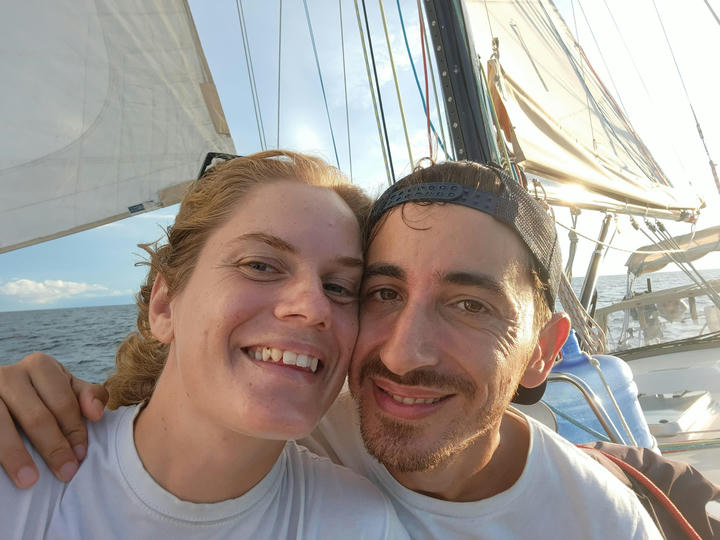
The third night
I rested some more, sleeplessly though and then we switched. At around 9, we shared dinner in the cockpit. Yalçın told me about the Turkish podcast he had been listening to and we debated the (ir)relevance of IQ. Tirb was tacking his way up towards the town of Cabo de la Vela, where we were hoping to have internet for the weather forecast and possibly spend the rest of the night at anchor to both get some sleep; if it made sense according to the forecast. The waves had receded, probably as we were getting protection from the cape. That was good, but the wind was also low and our tacks were pretty inefficient: we were making 0 to 2 knots VMG (the speed at which you are actually approaching your target). I diligently tacked back and forth in the dark, hand-steering on top of the hydrovane to improve the heading. When getting close to shore, a flashing red light, then lights appeared and unsure of their distance or nature, I tacked away. Lightning was never far, but it always looked like we were out of it. Two container ships passed around on the AIS. We were so slow that, of course, they disappeared without the need for us to do anything. When Yalçın emerged after his three-hour sleep, I realized we had made very little progress to our destination. 5 miles would have been good news, it was more 2 or 3, and the wind speed was dropping again, increasing our tacking angle and decreasing our speed even further. In three hours of motoring instead, we could be in Cabo de la Vela, this beating up was ridiculous! Yalçın was on the same page and we furled the jib and started the engine. I wanted to sleep, he would wake me up at the entrance of the Cabo Vela bay. I had found the paper chart of the area in the old nautical guide in Spanish that some cruisers had given to us in Panamarina. It was definitely better than Navionics, whose chart said it dated back to 1930. But the guidebook also mentioned little water bottles tied as guide, like channel markers. I wasn't entirely sure of my translation, but wrapping a line around the prop at night was for sure a bad idea. We'd have to proceed with caution.
After two hours of deep sleep and no significant lightning action on Yalçın's side, he woke me up. We had internet and he was getting the forecast as we were entering the bay. I emerged as rapidly as deep sleep allowed and jumped on the phone to look at the forecast. Question 1 was: were we dropping anchor? A quick sight at the forecast revealed we were already getting some tradewinds and they wouldn't weaken until Wednesday-Thursday. Hence, there was no rush to keep going, we could definitely anchor, rest, and prepare more food. We have to take the main down then, Yalçın pointed. Oh, yeah! We had little distance. He quickly went to the mast and we doused rapidly. I then went to the bow to prep the anchor and light our way up. First shine, I get a bundle of bottles in my spotlight. Ok, so I understood well and... we are extremely lucky as Yalçın seemed to have shot exactly in the middle of the channel they mark. We go in slowly as I alternate between lighting up and detaching and prepping the anchor. We finally drop in 33 feet, not far from the lighthouse. A row of lights is flashing on land, I wonder what they may be, but it doesn't matter really. The next morning, I will discover rows of wind generators and I ignore Yalçın already came to this conclusion while seeing the shore getting closer and closer at night: of course, Cabo de la Vela, a wind surfer's hot spot, there'd be enough wind to produce electricity.
Question 2: do we close the sail pack?
I explain to Yalçın my rapid conclusion after quickly watching the weather. We can stay for a bit according to my interpretation, how about he looks at it again while I close the sail pack, which is not a ton of effort anyway. In the dark, we hear the sound of a motor, a fisherman panga very likely. It is almost 4 AM. It's approaching fast. Even though unlikely, an unfriendly encounter is really the last thing we want. I turn off the navigation light below deck. We are now incognito. Something I have kept doing whenever an unidentified vessel approached during the trip, peace of mind... to some extent, because you then need to worry about collision and not seeing the windex at the top of the mast, plus using a white spotlight to trim the sails probably undermines all those efforts anyway, as it very likely makes us highly visible.
Anyhow, to stay or not to stay? Question 3. We finally sit side by side and look at Windy together. Yalçın sees my point of a window on Wednesday-Thursday, but he agrees it is just a little too far in time, the forecast may likely change - it could very well disappear - and we are in the groove right now - the panga sound in the night seems to have easily shifted my inclination from staying for more sleep to leaving right on and not to have to worry about people, also probably as I get more awake. For Yalçın, the trades are in, yes, but nothing is well established yet: if we'd go for it, we'd have a chance to pass when the current isn't full-fledged and with winds gusting in the 20ies instead of their customary 25es. I make some extra checks in the forecast, especially what the night we'd spend beating up in the current (likely Sunday night), is going to look like in terms of thunderstorms. Very likely, we won't have the luxury of avoiding dark clouds on top of an already challenging navigation. In addition to the current carrying us Northwest, we are not going to want to go South too much in an attempt to compensate as there are Venezuelan islands and Venezuela is not recommended to sailors at all at the moment. Really not much lightning in the forecast, I'm convinced: we should lift anchor and go for it!! We take a minute to breathe but not much more, and go go go. Our time is counted from now on. The plan is to motor in the windless night, at 5 knots, we'd reach the tip of Colombia by noon the next day. By then, the trade should fill in, and we would start our 120-130 miles challenge with a North, then Northeast wind, trying to thread the part where the current is the weakest according to the forecast. Halfway between Aruba and Curaçao, we would start our descent to the latter, with even hopes of a reverse current, bringing us back from the North towards the island. We'd make the most out of the motoring section to prepare more food as it seems a more challenging section of our trip is starting and we are left with only lentils from our initial food prep.
We use the last bit of the internet to send news to our families and take detailed screenshots of the weather forecast - we now have the ability to download grib files but we are so used to the model in Windy that it's the most reliable for us. No internet is expected before the islands. Yalçın finally goes down to sleep as the first lights appear behind us, revealing the low-lying mountains of Cabo de la Vela. I am wide awake now and decided to make the most out of this flat water shift. At the lighthouse, I turn right with the feeling we are starting a new adventure and a nice impression about us not bailing out on that one! A few days ago, before these few wonderful days at sea that repumped my confidence a bit, I would for sure have voted for bailing, a short-term reward that doesn't analytically make sense in the long run...
